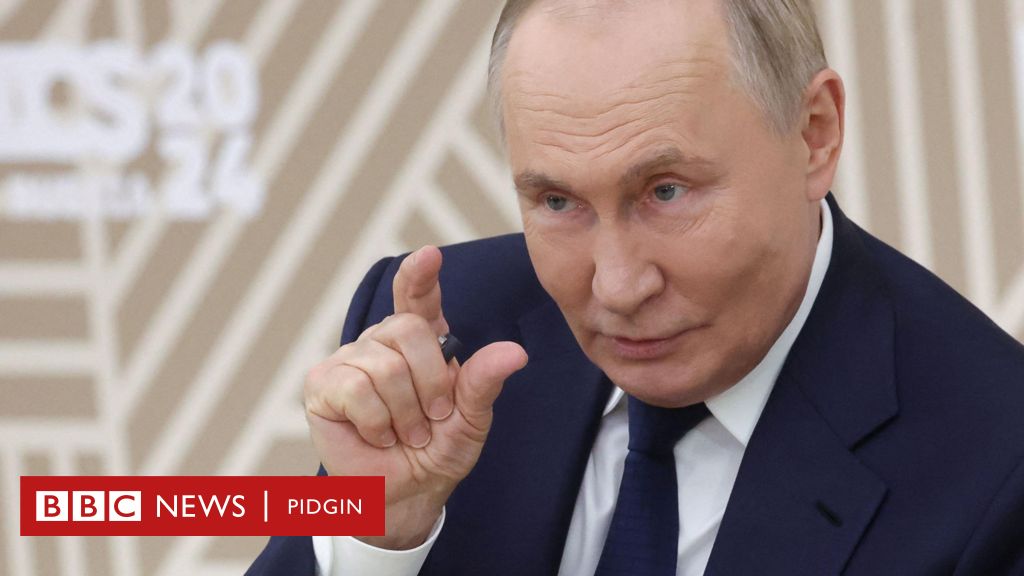Wia dis foto come from, Reuters
- Author, Steve Rosenberg
- Role, Russia editor
-
Imagine say you be Vladimir Putin.
Di West dey see you as outcast for invading Ukraine. Sanctions plenty wit di plan to cut off your country economy from global markets.
Arrest warrant from di International Criminal Court dey one side for you.
So how you fit show say all dis pressure no dey work? Na to try to host summit.
Dis week for di city of Kazan, President Putin go greet more dan 20 heads of state for di Brics summit of emerging economies. Among di leaders wey dey invited na China Xi Jinping, Indian Prime Minister Narendra Modi and Iranian President Masoud Pezeshkian.
Di Kremlin say dis na one of di “largest-scale foreign policy events ever” for Russia.
“Di clear message na say di attempts to isolate Russia don fail,” na wetin Chris Weafer think, na im be di founding partner of consultancy firm Macro-Advisory.
“Na big part of di message from Kremlin say Russia dey withstand sanctions. We know say serious cracks dey under di surface. But from a geopolitical level, Russia get all dis friends and all of dem go be Russia partners.”
Who be Russia friends?
So, who be Russia friends?
Brics stand for Brazil, Russia, India, China and South Africa. Di group, wey many dey refer to as counterweight to Western-led world, don expand to include Egypt, Ethiopia, Iran and di United Arab Emirates.
Saudi Arabia, too, dey invited to join.
Di Brics nations account for 45% of global population. If you add together, members economies dem worth more dan $28.5tn (£22tn). Dat na around 28% of di global economy.
Russian officials dey tok say anoda 30 kontris wan join Brics or seek closer ties wit di club. Some of dis nations go take part for di summit. For Kazan dis week, expect a lot of tok-tok about Brics representing di “global majority”.

Wia dis foto come from, EPA
Wetin dis year Brics go achieve?
Apart from providing Vladimir Putin im moment for di geopolitical stage, wetin be di tin wey dis event go dey likely to achieve?
Wit di mind to reduce di pressure from Western sanctions, di Kremlin leader go hope to convince Brics members to adopt an alternative to di dollar for global payments.
“A lot of di problems Russia economy dey face dey linked to cross-border trade and payments. And a lot of dat dey linked to di US dollar,” na so Oga Weafer tok.
“Di US Treasury get ogbonge power and influence ova global trade simply becos di US dollar na di main currency for settling dat. Russia main interest na to break di dominance of di US dollar. E wan Brics kontris to create an alternative trade mechanism and cross-border settlement system wey no go involve di dollar, di euro or any of di G7 currencies, so sanctions no go mata so much.”
But critics dey point to differences within Brics. “Likeminded” no be word you go use to describe di current membership.
“In some ways, na good job for di West say China and India no go ever agree about anytin. Becos if those two really serious, Brics go get ogbonge influence,” na so Jim O’Neill, wey be former Chief Economist of Goldman Sachs tok.
“China and India dey do dia best to avoid to want to attack each oda lot of di time. To try to get dem to really co-operate on economic things na serious challenge.”
Na Oga O’Neill wey, at di beginning of di century, bin dream about di acronym “Bric” for four emerging economies wey im believe say dem “suppose bring into di centre of global policy making”.
But di four letters take on a life of dia own, afta di corresponding nations form dia own Bric group – later Brics, wen South Africa bin join.
Dem attempt to challenge di dominance of di G7: di world seven largest “advanced” economies (Canada, France, Germany, Italy, Japan, di UK and di US).
No be only just India and China wey get dia differences. Tension also dey between two of di newest Brics members, Egypt and Ethiopia. And, despite peace tok, Iran and Saudi Arabia dey one side, those two na regional rivals.
“Di idea of say all of dem go fundamentally agree on something of great substance dey crazy really,” Oga O’Neill believe.
And while Russia, wey di anti-Western sentiment dey ginger, dey one side dey tok about creating a “new world order”, oda Brics members, like India, dey look to retain good political and economic relations wit di West.
For Kazan, Vladimir Putin task go be to look ova di differences and paint a picture of unity, while im show di Russian public – and di international community – say im country dey far from isolated.

